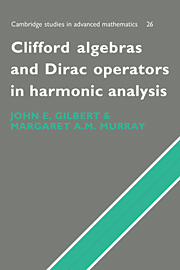Introduction
Published online by Cambridge University Press: 23 November 2009
Summary
In this book we present a comprehensive introduction to the use of Clifford algebras and Dirac operators in harmonic analysis and analysis more generally. In the past 30 years, Clifford algebras and Dirac operators have played a key role in three of the most important areas of mathematical research during that time: the boundedness of the Cauchy integral on Lipschitz surfaces, the realization of discrete series representations of semi-simple Lie groups, and the celebrated Atiyah–Singer index theorem. Much as an analyst would like to understand and appreciate these developments, however, there are formidable technical barriers to doing so, particularly for more classically trained analysts, as we have found to our cost over the years. Thus our aim from the outset has been to meld into a coherent and reasonably self-contained whole a body of ideas from classical singular integral theory, representation theory and analysis on manifolds, with a view to making this material accessible to more classically trained analysts.
Now the starting point for much of classical harmonic analysis is the study of the boundary regularity of harmonic functions in domains in Euclidean space. Classical Hardy space theory explores the consequences of the improved boundary regularity obtained when consideration is restricted to analytic functions in the plane. On the other hand, for SL(2, ℝ), the starting-point for representation theory of semi-simple Lie groups, some important unitary representations become irreducible only on restriction to analytic functions.
Information
- Type
- Chapter
- Information
- Publisher: Cambridge University PressPrint publication year: 1991
